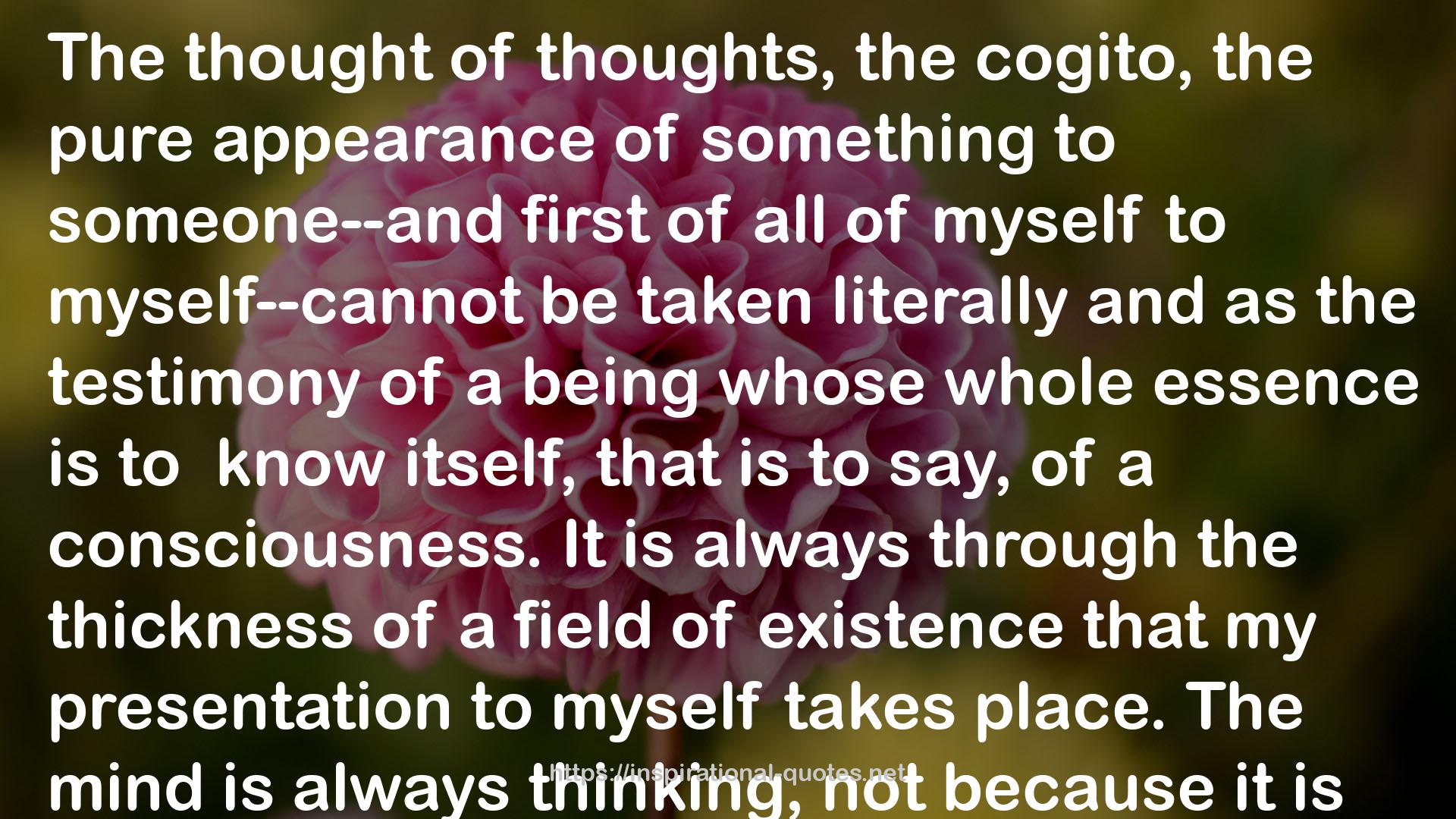" The thought of thoughts, the cogito, the pure appearance of something to someone--and first of all of myself to myself--cannot be taken literally and as the testimony of a being whose whole essence is to
know itself, that is to say, of a consciousness. It is always through the thickness of a field of existence that my presentation to myself takes place. The mind is always thinking, not because it is always in the process of constituting ideas but because it is always directly or indirectly tuned in on the world and in cycle with history. Like perceived things, my tasks are presented to me, not as objects or ends, but as reliefs and configurations, that is to say, in the landscape of praxis. And just as, when I bring an
object closer or move it further away, when I turn it in my hands, I do not need to relate its appearances to a single scale to understand what I observe, in the same way action inhabits its field so fully that anything that appears there is immediately meaningful for it, without analysis or transposition, and calls for its response. If one takes into account a consciousness thus engaged, which is joined again with itself only across its historical and worldly field, which does not touch itself or coincide with itself
but rather is divined and glimpsed in the present experience, of which it is the invisible steward, the relationships between consciousnesses take on a completely new aspect. For if the subject is not the sun from which the world radiates or the demiurge of my pure objects, if its signifying activity is rather the perception of a difference between two or several meanings--inconceivable, then, without the dimensions, levels, and perspectives which the world and history establish around me--then its action and all actions are possible only as they follow the course of the world, just as I can change the spectacle of the perceived world only by taking as my observation post one of the places revealed to me by perception. There is perception only because I am part of this
world through my body, and I give a meaning to history only because I occupy a certain vantage point in it, because other possible vantage points have already been indicated to me by the historical landscape, and because all these perspectives already depend on a truth in which they would be integrated. At the very heart of my perspective, I realize that my private world is already being used, that there is ''behavior" that concerns it, and that the
other's place in it is already prepared, because I find other historical situations to be occupiable by me. A consciousness that is truly engaged in a world and a history on which it has a hold but which go beyond it is not insular. Already in the thickness of the
sensible and historical fabric it feels other presences moving, just as the group of men who dig a tunnel hear the work of another group coming toward them. Unlike the Sartrean consciousness, it is not visible only for the other: consciousness can see
him, at least out of the corner of its eye. Between its perspective and that of the other there is a link and an established way of crossing over, and this for the single reason that each perspective claims to envelop the others. Neither in private nor in public history is the formula of these relationships "either him or me,"
the alternative of solipsism or pure abnegation, because these relationships are no longer the encounter of two For-Itselfs but are the meshing of two experiences which, without ever coinciding,
belong to a single world. "
Image for Quotes
 other's place in it is already prepared, because I find other historical situations to be occupiable by me. A consciousness that is truly engaged in a world and a history on which it has a hold but which go beyond it is not insular. Already in the thickness of the
other's place in it is already prepared, because I find other historical situations to be occupiable by me. A consciousness that is truly engaged in a world and a history on which it has a hold but which go beyond it is not insular. Already in the thickness of the sensible and historical fabric it feels other presences moving, just as the group of men who dig a tunnel hear the work of another group coming toward them. Unlike the Sartrean consciousness, it is not visible only for the other: consciousness can see
him, at least out of the corner of its eye. Between its perspective and that of the other there is a link and an established way of crossing over, and this for the single reason that each perspective claims to envelop the others. Neither in private nor in public history is the formula of these relationships "either him or me,"
the alternative of solipsism or pure abnegation, because these relationships are no longer the encounter of two For-Itselfs but are the meshing of two experiences which, without ever coinciding,
belong to a single world." style="width:100%;margin:20px 0;"/>